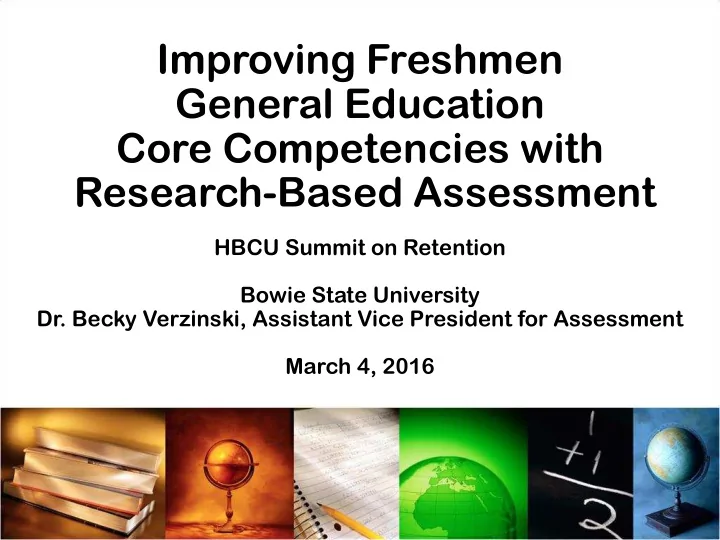

Improving Freshmen General Education Core Competencies with Research-Based Assessment HBCU Summit on Retention Bowie State University Dr. Becky Verzinski, Assistant Vice President for Assessment March 4, 2016
SESSION OUTCOMES Session participants will: • Understand the need for the pilot project • Review ACRL competencies and Gen Ed Program • Discuss what Research Skills Learning Module (RSLM) was designed to do • Examine select modules of the RSLM • Recognize advantages/challenges of RSLM
Past Assumptions We assumed that: • most students were experienced with using technology • most students were proficient with Microsoft Office • most students understood the basic functions of a library. * National assessments showed our students were at or above the mean for GE core competencies – but the iSkills assessment showed that our assumptions were wrong about information literacy and technological competency.
A Quick Review of GE Competencies • Written and Oral Communication • Scientific and Quantitative Reasoning • Critical Thinking • Information Literacy • Technological Competency
American College & Research Libraries ACRL Standards • Define • Access • Evaluate • Manage • Integrate • Create • Communicate ACRL/GE Competencies: Info Lit/Tech Comp/Crit Thinking
ACRL STANDARDS=RSLM=iSkills Test • Define= Module 1 • Access= Module 2 • Evaluate= Module 3 • Manage= Module 4 • Integrate = Module 5 • Create= Module 6 • Communicate= Module 7
Purpose of RSLM • Int ervention designed to improve research skills of freshmen • Improved research skills correlates to academic success • Academic success is directly related to retention of students
Many Reasons for Intervention • Needed to address the disconnect • MSCHE (St. 12 Gen Ed reporting) • Collaborative effort (librarians, admin, faculty) • Improve student preparedness and performance in GEP courses • Use of existing technology to work smarter! • Assessment guiding practice in GEP
Overall Goal of RSLM • Impact retention for all levels • Provide opportunity to students to learn basic research skills • Increase proficiency levels of 3 core competencies
Food for Thought The 1990s Digital Divide: the gap between those who have easy access to computers and the internet and those who do not. The 2010s Digital Divide: While access has increased substantially, the divide has shifted from an access issue to a kind of access divide (in- home broadband access vs. Internet access via cell phone). “An entertainment vs. empowerment divide” (Pew Research Center, www.pewinternet.org) How many of you have written a research paper using a cell phone?
TAKING A QUICK PEEK at RSLM https://bsuonline.blackboard.com/
WHO developed the pilot? • AVP for Assessment • Several librarians • Bb instructional technologist • FRSE 101 instructors (5) • Multiple collaborators on campus
WHEN was RSLM piloted? • Fall 2013 (Fourteen learning modules) Five RSLM FRSE 101 sections (iSkills taken in Nov) • RSLM worth 100 points in FRSE 101 • Five control FRSE 101 sections (iSkills taken in Dec) • 2014 Bulldog Summer Academy (no point value) • 2015 Bulldog Summer Academy (100 point value); iSkills given at end of summer
HOW was RSLM created? • Used Blackboard to build every module and collect assessment data (LOTTO training) • Developed a common theme • Based on seven ACRL standards • Focused on three GE competencies • Included Badge awards
What were the initial results? ETS iSkills (measures critical thinking, technological & informational literacy skills) 2012-2013 (Freshmen): BSU Median Score Results Category Define Access Evaluate Manage Integrate Create Communicate 2012 BSU 55 56 62 57 50 49 44 National 70 78 50 70 64 56 64 Median Score -15 -22 +12 -12 -13 -7 -20 Difference 2013 BSU 55 56 57 50 50 49 49 National 70 78 50 70 64 56 64 Median Score -15 -22 +8 -20 -13 -7 -13 Difference
Bulldog Academy iSkills Results Category Define Access Evaluate Manage Integrate Create Communicate 2014 BDA BSU 55 56 62 57 50 49 44 (Not integrated into National 70 78 50 70 64 56 64 English course) Median -15 -22 +12 -13 -14 -7 -20 Score Difference 2015 BDA BSU 55 56 57 50 50 49 49 (Fully integrated into National** 64 61 64 64 59 57 59 English course) Median -9 -5 -7 -14 -9 -8 -10 ** iSkills national Score reference group Difference updated in 2014
RSLM Pilot Study Results Mean iSkills Scores BDA *FRSE FRSE Control BDA All 101 Research Group Students Students Students Fall 2012 Skills (n=119) 2014 2015 2012-2015 COHORT (n=100) Fall 2013 2013-2014 (n=83) (n=81) (n=433) (n=133) * Testing occurred in Dec Mean 182 185 169 182 187 181 Score
TAKING A CLOSER LOOK at RSLM
https://bsuonline.blackboard.com/
Advantages and Challenges of Process Advantages • Paperless process (GREEN!) & cost effective • Use of existing Blackboard technology • Positive student feedback • Self-paced for students at different levels • Transferable to other GE courses by request • Assessment data for MSCHE reporting
Advantages and Challenges of Process Challenges • Labor intensive in the beginning • Learning curve with module development • Must have assigned point value in GE course • Smaller classes and more instructors • Pre-college students vs. older freshmen
ON THE HORIZON… • FALL 2016 COMM 101 launch • Same high point-value in each section • Add two more modules in manage/integrate • Self-paced and mostly self-scoring • RSLM Part 2 – COMM 240 course (add APA style, AB, grammar, punctuation) • Fall 2016 longitudinal data review
QUESTIONS OR COMMENTS… Thank you! CONTACT INFORMATION: Dr. Becky Verzinski Assistant Vice President for Assessment Office of the Provost bverzinski@bowiestate.edu 301-860-3501
Recommend
More recommend